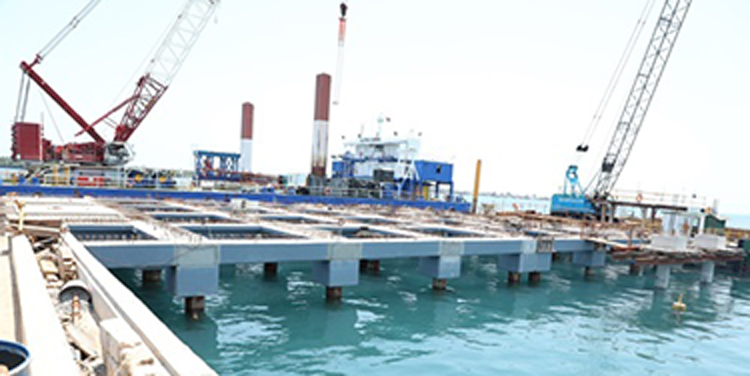The completion of Kenya’s first dedicated fish port in Shimoni, Kwale County, marks a pivotal moment in the nation’s pursuit of sustainable economic growth through the blue economy. Constructed at a cost of KSh2.6 billion over three years, the Shimoni Fish Port was officially handed over to the Kenya Ports Authority (KPA) by Southern Engineering Company (Seco), positioning the country to tap into its underutilized marine resources.
Speaking at the handover ceremony yesterday, KPA Managing Director Captain William Ruto said the port signals a strategic shift towards the sustainable exploitation of Kenya’s 142,000 square kilometer Exclusive Economic Zone (EEZ), which remains largely underexploited despite its immense commercial potential.
“The completion of the Shimoni Fish Port is a significant step forward in diversifying Kenya’s maritime infrastructure. It moves us beyond traditional cargo handling and into the strategic development of fisheries,” said Ruto. “This facility will empower our local fishing communities, create jobs, drive export growth, and reduce our reliance on foreign players in offshore fishing.”
Strategically located near the Kisite-Mpunguti Marine Park, the port is designed to transform the coastal fisheries sector. It features a modern jetty, processing and cold storage facilities, an ice-making plant, reefer stations, and waste management infrastructure—providing an end-to-end solution from ocean to market.
Once operational within six months, the facility is expected to handle up to 200 metric tonnes of fish per day and create over 1,000 direct jobs. KPA plans to advertise for an international port operator to manage the facility, with the tender opening the opportunity to both local and global investors.
Crucially, the Shimoni Fish Port addresses key constraints in Kenya’s marine sector—particularly post-harvest losses, which have long undermined artisanal fishing communities. By providing modern handling, storage, and processing capacity, the port is projected to drastically reduce waste and unlock value addition opportunities.
Marine fisheries currently contribute just 17% of Kenya’s total fish production, at approximately 26,000 tonnes annually, against an estimated potential of over 300,000 tonnes. The Shimoni port is expected to bridge this gap, catalyzing local fisheries and positioning Kenya as a significant player in the regional seafood market.
The port’s construction follows benchmarking missions by KPA in Spain, Morocco, and Seychelles, affirming the viability of such an investment. Seco General Manager Abdalla Athman emphasized that the project exemplifies the success of the ‘Buy Kenya Build Kenya’ initiative, with a Kenyan contractor delivering world-class infrastructure.
“This facility will be a game-changer for the local economy. We’re proud that a Kenyan company has delivered a project of such strategic national importance,” Athman noted.
Industry stakeholders see the Shimoni Fish Port as a critical anchor for future investments, including Special Economic Zones (SEZs) dedicated to fish processing and export. The port also strengthens Kenya’s hand in negotiating international fisheries agreements, demonstrating local capacity for sustainable exploitation and value addition.
Beyond economic gains, the project promises socio-economic transformation for Shimoni, Wasini Island, and surrounding communities, long dependent on small-scale fishing. According to project coordinator James Rai, the port will create opportunities across fishing, logistics, processing, and ancillary port services.
Ruto highlighted that plans are underway for future expansions, including a shipyard with floating docks and vessel maintenance services, further diversifying revenue streams and reducing Kenya’s reliance on foreign service hubs.
“With construction now complete and operationalization imminent, the Shimoni Fish Port stands as a landmark investment in Kenya’s blue economy—creating jobs, boosting exports, increasing food security, and driving sustainable coastal development,” concluded Ruto.
This article was published by Githua Kihara, an editorial consultant for FEAFFA’s Freight Logistics Magazine. For any inquiries, please contact us via email at editorial@feaffa.com or freightlogistics@feaffa.com, or reach out to Andrew Onionga directly at onionga@feaffa.com / +254733780240.





